|
Blood in the stool can appear as black stool, dark red stool, bright red stool or normal color stool (invisible to the naked eye). The symptom indicates a bleeding somewhere along the digestive tract, including the esophagus, stomach, small intestine, colon, rectum and anus. Bleeding may occur in one or more of these areas, for example from a stomach ulcer or from diffuse damages of an inflamed colon. Doctors rely on endoscopic or other diagnostic tests to locate the source of bleeding, they also need to know the specific symptoms and signs to help determinate the underlying causes.
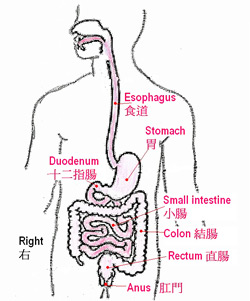 |
The digestive tract |
 |
Fresh blood coats on the stool, or comes after passing stool, or only on the toilet paper can be seen in hemorrhoids and anal fissures. |
 |
Blood mixed with the stool may suggest the bleeding is higher up in the colon; the color of blood tends to be dark red or maroon colored. |
 |
The darker the blood, the higher the site of bleeding in the digestive tract. |
 |
Persistent bloody stool that is accompanied with alternate constipation and diarrhea, and unexplained weight loss may suggest a rectal tumor. |
 |
Black, smelly and tarry stool is likely from a source in the upper gastrointestinal tract, such as ulcers in the stomach or the duodenum, or from the small intestine. |
 |
Bloody diarrhea that also contains mucus or pus, and is accompanied with frequent urge to have bowel movement, abdominal pain and fever are likely to have colitis. |
 |
Invisible blood in the stool may be the first sign of colon cancer or polyps, particularly in those 45 years old. Screening tests should be started if you have a family history of colon cancer or polyps. |
 |
A chronic bleeding can lead to anemia, which makes individuals gradually develop fatigue, weakness, dizziness, pallor and shortness of breath. |
 |
Iron supplements, black licorice, lead, blackberries, beets or other color foods can make the stool appear darker than normal. |
 |
Blood in the stool that is accompanied with other bleeding sites such as gum bleeding, nosebleed or easy bruising may suggest a systemic disorder. |
Generally, blood in the stool can be the result of a wide range of conditions, and the presentations vary according to the cause, location, duration and severity of the bleeding. Sometimes, a brisk bleeding in the upper digestive tract can pass gross blood from the rectum, while an occult or hidden bleeding may only be detectable by a fecal occult blood test. A doctor is the most qualified person to determine whether your bleeding condition is due to hemorrhoids, inflammatory bowel disease, rectal abscess, peptic ulcer, intestinal polyps, cancer or anal fissures. You should report to your family doctor as soon as possible if you notice blood in your stool, or any major change in the color, consistency or frequency of your bowel movements. The sooner you get a proper diagnosis, the easier it will be to treat.
In traditional Chinese medicine (TCM) understanding, stool is processed by a series of organs, and abnormalities in the stool correlate with the conditions of internal organs. Blood in the stool is a common symptom in many gastrointestinal problems, and is always indicated blood vessel damages. The symptom can be due to external pathogens, improper diet, emotional stress or chronic health problems that cause the gastrointestinal tract to develop damp-heat, blood stasis or qi deficiency, resulting in bleeding and other digestive problems. TCM therapeutic strategies for blood in the stool include:
 |
Cool blood to stop bleeding; |
 |
Clear heat and dampness pathogens to reduce the inflammatory reactions and soothe the digestive tract; |
 |
Activate blood and resume the normal circulation in the digestive tract; |
 |
Invigorate the spleen and stomach to promote the healing of digestive tract and enable it to function normally. |
TCM remedies are tailor-made for individuals. They are not only aimed to stop bleeding, but also treat the underlying problem, and thus facilitate a comprehensive healing process. TCM methods can work with conventional medicine in promoting the overall healing of a digestive problem and reduce the risk of recurrent bleeding.
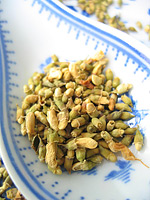 |
|
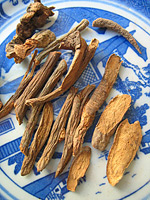 |
|
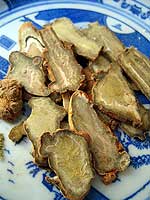 |
| pagoda tree flower |
|
garden burnet root |
|
notoginseng |
1. Herbal prescriptions for blood in the stool
When examining the stool, TCM physicians note the color and nature of the stool as well as the presence or absence of accompanying physical feelings, the information help them understand the pathologic changes of internal body, determine therapeutic strategies and design proper remedies. Common disharmony patterns that involve blood in the stool are as below.
Heat in stomach
Purple or dark purple hard stool, other signs may include a bitter taste in the mouth, bad breath, thirst, mouth sores, a burning pain in the stomach, the tongue is red and covered by dry and yellow coating, the pulse is rapid. The remedy should aim to clear stomach, purge fire, cool blood and stop bleeding.
Sample prescription: a modified combination of Purge Epigastrium Decoction and Ten Charred Herbs Powder
Heat in liver and stomach
Black or dark red stool, other signs include a bitter taste in the mouth, bloodshot eyes, discomfort in the rib sides and chest, irritability, dream-disturbed sleep, a red tongue covered by yellow coating, and the pulse is taut and rapid. The remedy should aim to soothe liver, clear stomach, cool blood and stop bleeding.
Sample prescription: Free and Easy Wanderer Plus and also herbs like rehmannia root, Chinese rhubarb, baical skullcap root and India madder rhizome
Blood stasis obstruction
Dark purple stool, other signs include distending pain in the abdominal and stomach regions, darkish face, or mass under the ribcage, or stabbing pain in the abdomen, red palms, spiderlike blood vessels on the abdomen and even excess abdominal fluid. The tongue is dark-purplish or has purple spots on it, and the pulse is taut or hesitant. The remedy should aim to activate qi (vital energy) and blood, resolve stasis and stop bleeding.
Sample prescription: Laughing Powder plus angelica root, India madder rhizome, ophicalcite, corydalis rhizome and notoginseng
Toxic heat accumulation
Bloody diarrhea that contains mucus or pus, other signs include abdominal colic, burning and heaviness sensations in the anus, frequent bowel urges, mouth dryness, thirst, a red or purple tongue covered by yellow coating, and the pulse is rolling and rapid. The remedy should aim to clear toxic heat, cool blood and stop bleeding.
Sample prescription: modified Restrain Blood Decoction
Damp-heat accumulation
Dark red or bright red blood in the stool, the stool may be watery, other signs include burning sensation in the anus, feeling incomplete emptying after bowel movement or frequent bowel urges, persistent abdominal pain, stuffiness in the chest, fatigue, limb heaviness, poor appetite, a sticky sensation in the mouth, a red tongue covered by yellow and greasy fur, and the pulse is hesitant and rapid. The remedy should clear heat, resolve dampness, cool blood and stop bleeding.
Sample prescription: A modified combination of Garden Burnet Root Powder and Pogada Tree Flower Powder
Spleen weakness leading to qi sinking
A mild bloody stool, feeling weakness during passing the stool, loose bowels, other signs include heaviness in the anus, mental fatigue, feeble voice, paleness, dizziness, poor appetite, a pale tongue, and the pulse is weak. The remedy should aim to invigorate spleen, and reinforce its ability to astringent blood.
Sample prescription: Tonify the Middle & Augment the Qi Decoction plus roasted ginger, common bletilla tuber and garden burnet root
Spleen and stomach weakness leading to internal coldness
Dark purple blood in the stool or tarry stool, loose bowels, dull pain in the abdominal and stomach regions that can be relieved by pressing or warming, other signs include paleness, limb coldness, mental fatigue, and general weakness. The tongue is pale and covered by glossy and white coating, and the pulse is deep and thready. The remedy should aim to invigorate and warm spleen, replenish qi and stop bleeding.
Sample prescription: Yellow Earth Decoction plus roasted ginger, ophicalcite and notoginseng
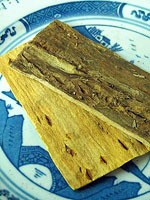 |
|
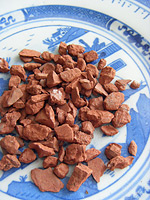 |
|
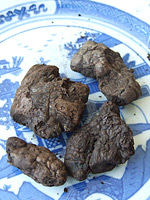 |
| Amur corktree bark |
|
ochre minerals |
|
roasted ginger |
2. Home care advice for blood in the stool
For individuals with blood in the stool, a healthy eating plan is crucial for the body to repair damages and regain vitality for recovery. The daily meals should be simple and easily digested, eat in regular time and in appropriate amount each time, so as to reduce the workload of the digestive tract. Alcohol, smoking, uncooked or toasted or greasy foods irritate the lining of the digestive tract, and thus should be limited. It is also advised to eat more foods that help alleviate the accompanying symptoms and reduce complications of the bleeding. Individuals need to select foods according to their own particular health needs, for example:
 |
Constipation should eat more vegetables and fiber rich foods, so as to help form soft and bulky stools. Foods like nuts, sesames, banana, honey, black fungus and white fungus can lubricate the intestines and promote bowel movements. |
 |
Diarrhea should eat foods that help reduce the inflammatory reactions of the digestive tract, such as lettuce stem or leaf, water chestnut, purslane, red rice bean, lotus root, wax gourd seed, garlic and coix seed. |
 |
When there is indigestion, stomach upset or poor appetite, ingredients like ginger, tangerine peel, charred hawthorn fruit, Chinese radish, maltose, pepper, fennel and onion can be added in the meals to stimulate appetite and promote digestion. |
 |
Chronic and prolonged bleeding is usually accompanied with problems like dizziness, general weakness, paleness and breath shortness, individuals need extra nutrient support to promote overall wellbeing. Foods like Chinese yam, poria, red dates, Chinese wolfberry, lotus seed, peanut, mulberry, longan aril, egg, daily products and mutton invigorate the spleen and promote the production of blood and qi. |
In case if the symptoms are seriously disrupted daily life, individuals can go to the TCM physicians and ask some remedies for relief. Other life habits such as regular bowel movements, drinking plenty of water, reducing mental stress and proper posture to avoid putting extra pressure on the abdomen are also necessary.
|